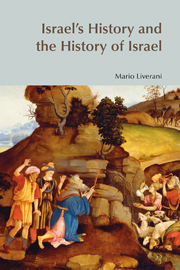Book contents
- Frontmatter
- Dedication
- Contents
- List of Tables and Illustrations
- Foreword
- Abbreviations
- IMPRINTING
- Part I A NORMAL HISTORY
- INTERMEZZO
- Chapter 10 THE AXIAL AGE
- Chapter 11 THE DIASPORA
- Chapter 12 THE WASTE LAND
- Part II AN INVENTED HISTORY
- EPILOGUE
- Bibliography
- Index of References
- Index of Names of Persons and Deities
- Index of Placenames
Chapter 11 - THE DIASPORA
from INTERMEZZO
- Frontmatter
- Dedication
- Contents
- List of Tables and Illustrations
- Foreword
- Abbreviations
- IMPRINTING
- Part I A NORMAL HISTORY
- INTERMEZZO
- Chapter 10 THE AXIAL AGE
- Chapter 11 THE DIASPORA
- Chapter 12 THE WASTE LAND
- Part II AN INVENTED HISTORY
- EPILOGUE
- Bibliography
- Index of References
- Index of Names of Persons and Deities
- Index of Placenames
Summary
The Fate of the Political Elite
While Zedekiah, who had betrayed his sworn oath and tried to resist the siege, suffered a terrible punishment, Jehoiachin, who had surrendered in time, was brought to Babylon as an honoured prisoner. From administrative Babylonian texts (ANET, 308), dated between the tenth and thirty-fifth years of Nebuchadrezzar, it is clear that the ex-king not only received food and oil rations (like other foreigners of various origin: Phoenicians, Lydians, and Greeks), together with his five sons, but also retained the title of ‘king of Judah’.
When eventually Nebuchadrezzar died in 562 and Awil-Marduk succeeded him, the new king celebrated his enthronement with an amnesty from which both the king of Tyre, Merbalos and Jehoiachin benefited. The former was returned to his city (C. Ap. 1.158), while Jehoiachin became a kind of ‘guest’ (2 Kgs 25.27 = Jer. 52.31–34) who ate at the king's table, with a place even higher than that of the other kings in a similar situation.
Recognized as ‘king of Judah’ by the Chaldaeans, Jehoiachin was also obviously recognized as such by the Judean exiles in Babylon, who considered him the chief of their community, respected by all. His sons Shealtiel and Sheshbazzar, and then his grandson Zerubbabel, Shealtiel's son, were to play an important role in the events of the exile and the return. Sheshbazzar is called ‘prince of Judah’ (Ezra 1.8) and ‘commissar’ (pehah) of the Persian king (Ezra 5.14) at the time of the return, while Zerubbabel is clearly the civil leader of the returnees (Ezra 2.2; Hag. 1.1).
- Type
- Chapter
- Information
- Israel's History and the History of Israel , pp. 214 - 230Publisher: Acumen PublishingPrint publication year: 2005

